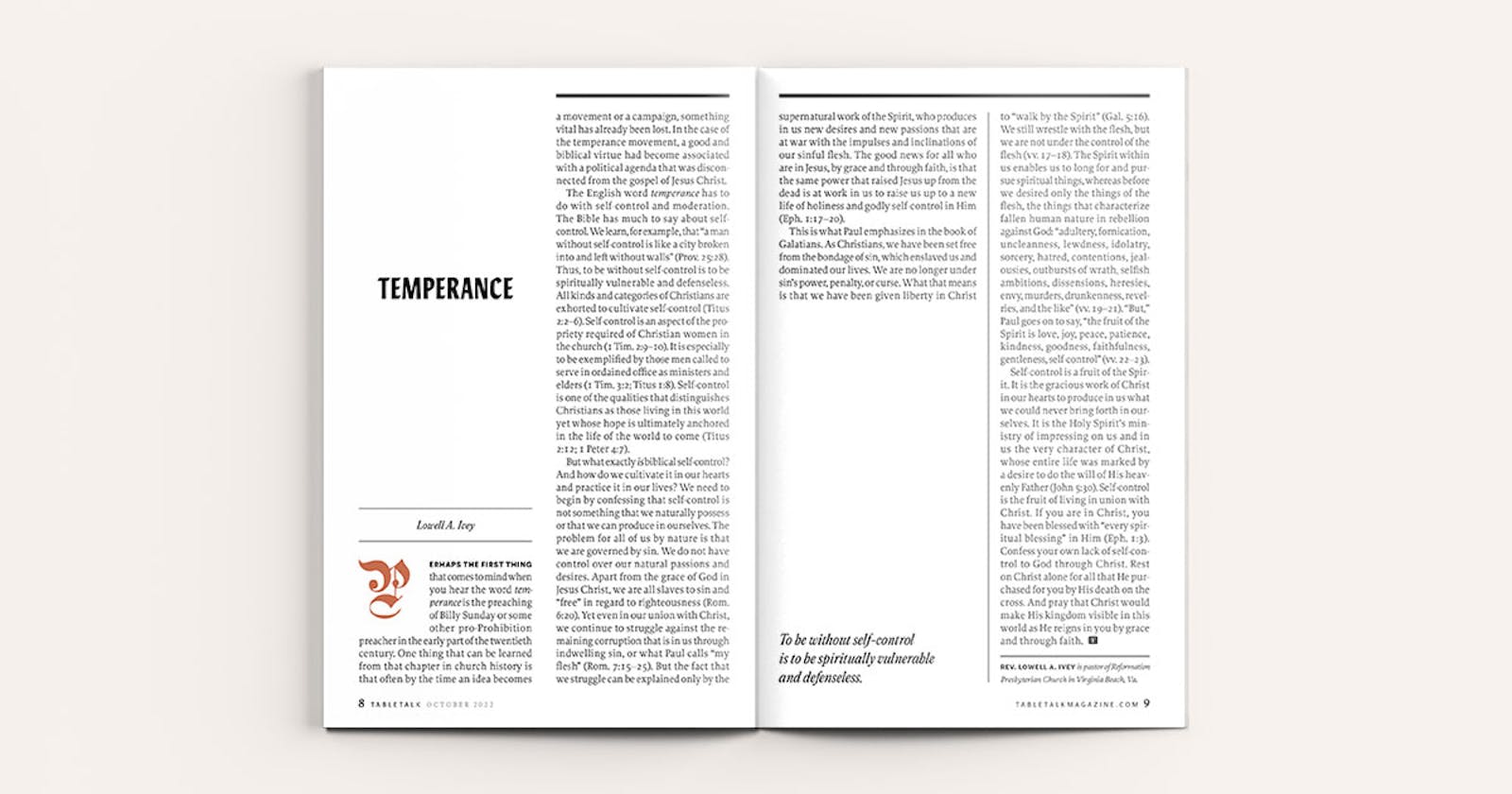
Request your free, three-month trial to Tabletalk magazine. You’ll receive the print issue monthly and gain immediate digital access to decades of archives. This trial is risk-free. No credit card required.
Try Tabletalk NowAlready receive Tabletalk magazine every month?
Verify your email address to gain unlimited access.
Perhaps the first thing that comes to mind when you hear the word temperance is the preaching of Billy Sunday or some other pro-Prohibition preacher in the early part of the twentieth century. One thing that can be learned from that chapter in church history is that often by the time an idea becomes a movement or a campaign, something vital has already been lost. In the case of the temperance movement, a good and biblical virtue had become associated with a political agenda that was disconnected from the gospel of Jesus Christ.
The English word temperance has to do with self-control and moderation. The Bible has much to say about self-control. We learn, for example, that “a man without self-control is like a city broken into and left without walls” (Prov. 25:28). Thus, to be without self-control is to be spiritually vulnerable and defenseless. All kinds and categories of Christians are exhorted to cultivate self-control (Titus 2:2–6). Self-control is an aspect of the propriety required of Christian women in the church (1 Tim. 2:9–10). It is especially to be exemplified by those men called to serve in ordained office as ministers and elders (1 Tim. 3:2; Titus 1:8). Self-control is one of the qualities that distinguishes Christians as those living in this world yet whose hope is ultimately anchored in the life of the world to come (Titus 2:12; 1 Peter 4:7).
But what exactly is biblical self-control? And how do we cultivate it in our hearts and practice it in our lives? We need to begin by confessing that self-control is not something that we naturally possess or that we can produce in ourselves. The problem for all of us by nature is that we are governed by sin. We do not have control over our natural passions and desires. Apart from the grace of God in Jesus Christ, we are all slaves to sin and “free” in regard to righteousness (Rom. 6:20). Yet even in our union with Christ, we continue to struggle against the remaining corruption that is in us through indwelling sin, or what Paul calls “my flesh” (Rom. 7:15–25). But the fact that we struggle can be explained only by the supernatural work of the Spirit, who produces in us new desires and new passions that are at war with the impulses and inclinations of our sinful flesh. The good news for all who are in Jesus, by grace and through faith, is that the same power that raised Jesus up from the dead is at work in us to raise us up to a new life of holiness and godly self-control in Him (Eph. 1:17–20).

This is what Paul emphasizes in the book of Galatians. As Christians, we have been set free from the bondage of sin, which enslaved us and dominated our lives. We are no longer under sin’s power, penalty, or curse. What that means is that we have been given liberty in Christ to “walk by the Spirit” (Gal. 5:16). We still wrestle with the flesh, but we are not under the control of the flesh (Gal. 5:17–18). The Spirit within us enables us to long for and pursue spiritual things, whereas before we desired only the things of the flesh, the things that characterize fallen human nature in rebellion against God: “adultery, fornication, uncleanness, lewdness, idolatry, sorcery, hatred, contentions, jealousies, outbursts of wrath, selfish ambitions, dissensions, heresies, envy, murders, drunkenness, revelries, and the like” (Gal. 5:19–21). “But,” Paul goes on to say, “the fruit of the Spirit is love, joy, peace, patience, kindness, goodness, faithfulness, gentleness, self-control” (Gal. 5:22–23).
Self-control is a fruit of the Spirit. It is the gracious work of Christ in our hearts to produce in us what we could never bring forth in ourselves. It is the Holy Spirit’s ministry of impressing on us and in us the very character of Christ, whose entire life was marked by a desire to do the will of His heavenly Father (John 5:30). Self-control is the fruit of living in union with Christ. If you are in Christ, you have been blessed with “every spiritual blessing” in Him (Eph. 1:3). Confess your own lack of self-control to God through Christ. Rest on Christ alone for all that He purchased for you by His death on the cross. And pray that Christ would make His kingdom visible in this world as He reigns in you by grace and through faith.
